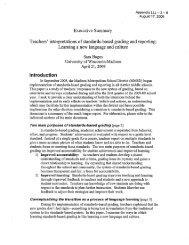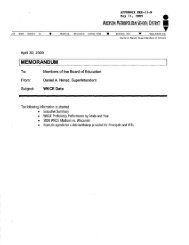MADISON METROPOliTAN SCHOOl DISTRICT - School Information ...
MADISON METROPOliTAN SCHOOl DISTRICT - School Information ...
MADISON METROPOliTAN SCHOOl DISTRICT - School Information ...
Create successful ePaper yourself
Turn your PDF publications into a flip-book with our unique Google optimized e-Paper software.
Appendix B<br />
6th Grade Core Reading Instruction<br />
Sixth grade is an important year for students as they transition from elementary to middle school.<br />
lnstructionally, students this age are 'expected to read material that is increasingly complex. In order to<br />
develop these more advanced skills, explicit reading instruction is necessary.<br />
The MMSD 2010-2011 literacy program evaluation revealed a lack of systematic professional<br />
development to support sixth grade reading instruction. Additionally, there was an inconsistency in the<br />
resources and materials available. The evaluation also identified inequitable access to sixth grade core<br />
reading classes across middle schools, ranging from 0 to 50 minutes daily.<br />
To addresses these critical findings, one focus during the 2011-2012 school year has been to improve<br />
and align sixth grade core reading instruction across all middle schools. This was accomplished through<br />
targeted professional development and adding consistent instructional resources. Additionally, equitable<br />
daily minutes of instruction will begin in the fall of the 2012-2013 school year. Following is a description<br />
of these actions.<br />
First, systematic professional development was provided to all sixth grade teachers of reading, inclusive<br />
of regular education, special education, English as a Second Language, Bilingual Resource, and<br />
Developmental Bilingual Education teachers. All teachers were asked to attend an initial core session<br />
during the first semester, and then given a choice between three workshops to attend during the second<br />
semester. Additionally, each middle school was provided opportunities for curricular collaboration within<br />
building-based teams to apply their learning to their instruction<br />
The one day core professional development session established expectations for sixth grade reading<br />
instruction. These expectations included consistent instructional strategies for comprehension, fluency,<br />
vocabulary, and word study in a Readers' Workshop model. This model allows teachers to meet the<br />
needs of a range of readers through engaging and differentiated instruction using mini-lessons for<br />
whole/small group, text discussion groups, and conferencing.<br />
During the second semester, teachers selected from three one-day sessions according to their diverse<br />
professional needs. Workshops included: Effective Strategies for Students Reading Below Grade Level,<br />
Implementing a Readers' Workshop, and Using Reading Assessments to Inform Instruction. In each<br />
session teachers honed their understanding and practice of effective strategies, structures, and<br />
assessment for sixth grade reading instruction.<br />
This professional development will be sustained through repeated offerings of the core session and three<br />
workshops during the summer months. This professional development will be offered in the fall to any<br />
new hires. Teachers have also been given access to Moodie, a Virtual Learning Environment containing<br />
professional development resources from the sessions, links to relevant websites, and curricular<br />
materials.<br />
The second issue addressed was the inconsistency in the resources and materials available. Teachers<br />
and schools were provided with professional texts, model units and supplementary materials, and<br />
differentiated student novels/books. These materials are listed below.<br />
Professional Resources: The following professional resources have been provided to teachers and<br />
schools to support sixth grade core reading instruction:<br />
33<br />
• Mini-Lessons for Literature Circles<br />
• Do-able Differentiation


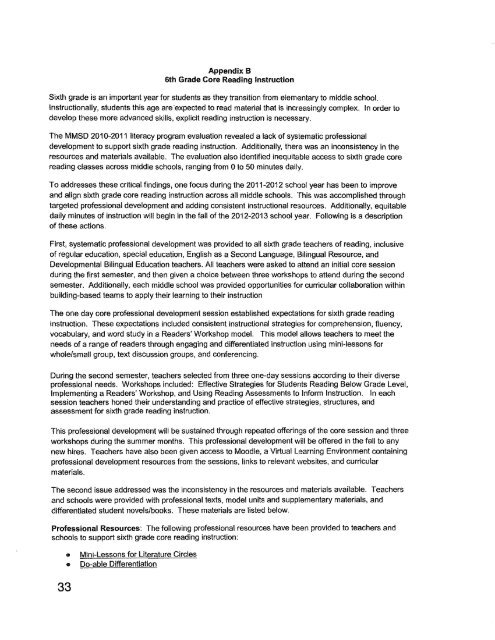
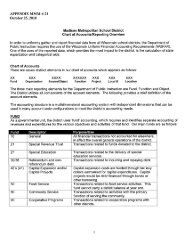
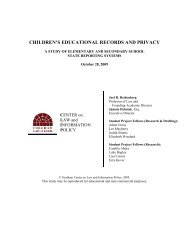
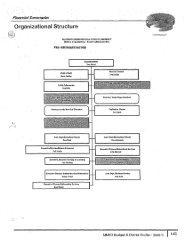
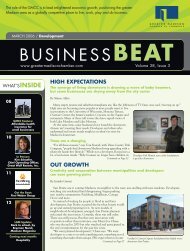
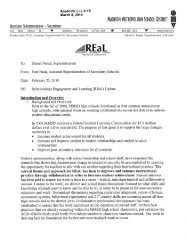
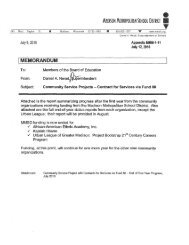
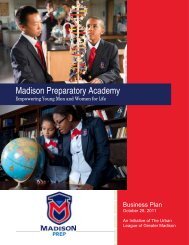
![by Shaina Wright [PDF] Ralph Waldo Emerson Prize 2006 - School ...](https://img.yumpu.com/26083584/1/174x260/by-shaina-wright-pdf-ralph-waldo-emerson-prize-2006-school-.jpg?quality=85)
